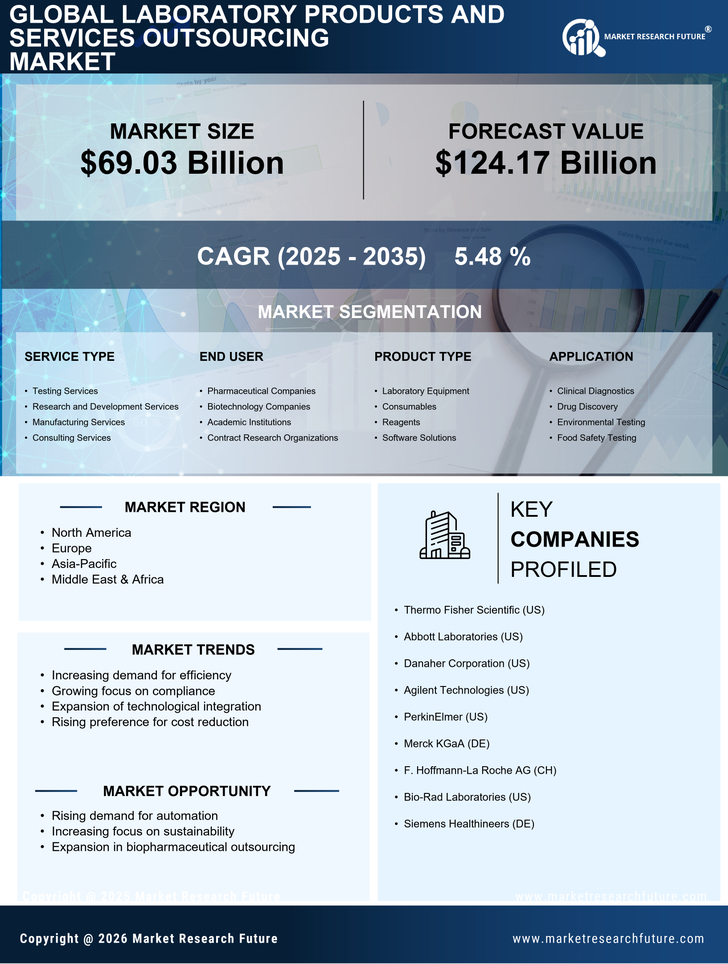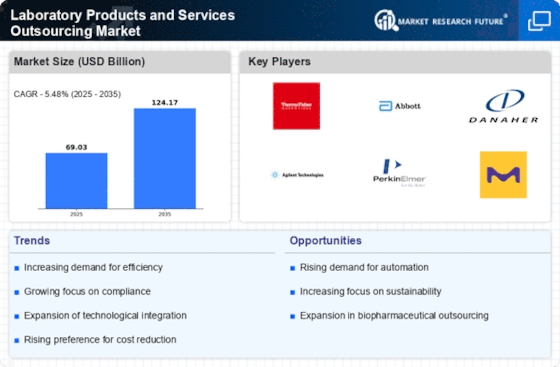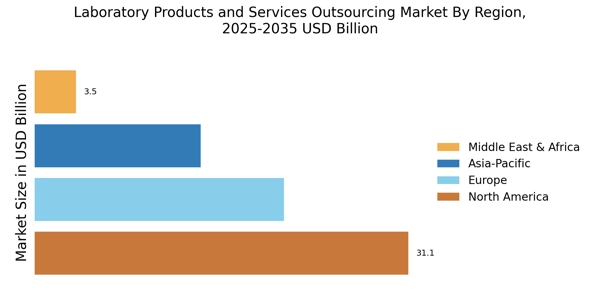Increased Focus on Sustainability
The Laboratory Products and Services Outsourcing Market is increasingly influenced by a growing focus on sustainability and environmental responsibility. Organizations are recognizing the importance of sustainable practices in laboratory operations, leading to a shift towards outsourcing services that prioritize eco-friendly methodologies. This trend is reflected in the rising demand for laboratories that implement green practices, such as waste reduction and energy efficiency. As sustainability becomes a key consideration for businesses, the Laboratory Products and Services Outsourcing Market is likely to benefit from partnerships with providers that align with these values, fostering a more sustainable future.
Rising Demand for Cost Efficiency
The Laboratory Products and Services Outsourcing Market experiences a notable increase in demand for cost efficiency among organizations. Companies are increasingly seeking to reduce operational costs while maintaining high-quality standards. Outsourcing laboratory services allows firms to leverage specialized expertise without the burden of maintaining in-house capabilities. This trend is underscored by a report indicating that outsourcing can reduce laboratory operational costs by up to 30%. As organizations strive to optimize their budgets, the Laboratory Products and Services Outsourcing Market is likely to see sustained growth, driven by the need for financial prudence and resource allocation.
Technological Integration and Automation
The Laboratory Products and Services Outsourcing Market is witnessing a transformative shift due to technological integration and automation. Advancements in laboratory technologies, such as robotics and artificial intelligence, are enhancing the efficiency and accuracy of laboratory processes. As organizations adopt these technologies, they often turn to outsourcing to access cutting-edge solutions without the need for substantial capital investment. Reports suggest that the integration of automation in laboratory services can improve productivity by up to 40%. This trend indicates a promising future for the Laboratory Products and Services Outsourcing Market as companies seek to leverage technology for improved operational performance.
Regulatory Compliance and Quality Assurance
The Laboratory Products and Services Outsourcing Market is shaped by the stringent regulatory compliance requirements that organizations must adhere to. As industries face increasing scrutiny from regulatory bodies, the need for high-quality laboratory services becomes paramount. Outsourcing laboratory functions to specialized providers ensures that organizations meet compliance standards while benefiting from the expertise of seasoned professionals. This trend is particularly evident in sectors such as pharmaceuticals, where adherence to Good Laboratory Practice (GLP) is critical. The Laboratory Products and Services Outsourcing Market is likely to expand as companies prioritize quality assurance and regulatory compliance in their operations.
Expansion of Research and Development Activities
The Laboratory Products and Services Outsourcing Market is significantly influenced by the expansion of research and development (R&D) activities across various sectors. Industries such as pharmaceuticals, biotechnology, and environmental science are investing heavily in R&D to innovate and develop new products. This surge in R&D spending, which has been reported to reach over 200 billion in certain regions, necessitates the outsourcing of laboratory services to meet the increasing demand for specialized testing and analysis. Consequently, the Laboratory Products and Services Outsourcing Market is poised for growth as organizations seek to enhance their R&D capabilities through strategic partnerships.


















